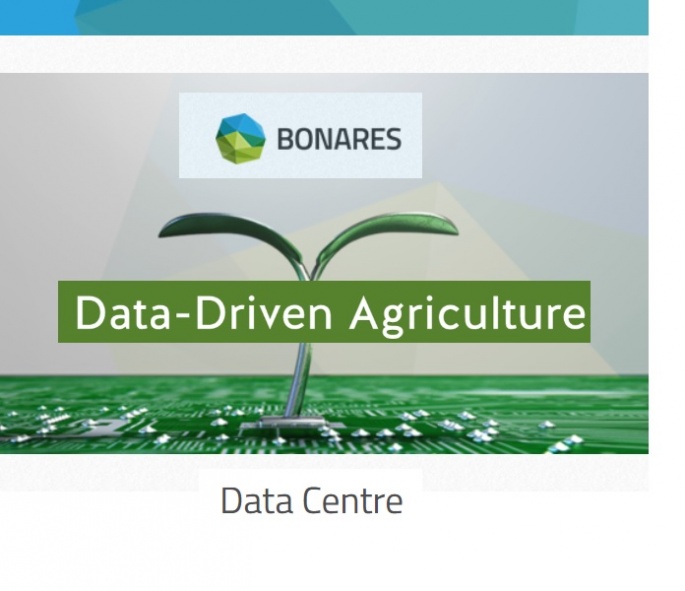BonaRes: a community-driven Data Portal for interoperable Agricultural Data
25/02/2019


Sustainable soil management implies the efficient utilization of natural resources including water, energy, land, and nutrients. The resource efficient optimization of such soil services requires a systemic understanding of the biological, chemical and physical processes interacting in the soil system as well as its dynamics with soil management.
BONARES INITIATIVE
|
- funded by the German Federal Ministry for Education and Research (BMBF) - focuses on the sustainable use of soils for the bioeconomy. To this end, BonaRes conducts research to improve the evidence base for sustainable soil management. |
The ultimate goal of BonaRes is to extend the scientific understanding of soil ecosystems and to improve the productivity of soils and other soil functions while developing new strategies for a sustainable use and management of soils.
The BonaRes initiative integrates the BonaRes Centre as well as 10 interdisciplinary collaborative projects that help ensure securing productivity and efficiency of soil as a resource in the long run by researching possibilities to optimize soil function and asking questions such as:
- how can the use of water and nutrition be made more efficient?
- how can land use strategies and land use management be optimized?
BONARES CENTER IS... |
... the transfer of existing and newly generated knowledge on soil functions into an operational scientific evidence base for decision-making on soil management in the context of a sustainable bioeconomy. Main tasks are:
- the establishment of required infrastructure for an efficient communication and the exchange of soil-related data,
- modelling concepts and assessment tools for a sustainable soil management.
The future vision is that decisions on soil management options can be based on improved and operational scientific evidence that will lead to an improved maintenance of the fertility of soils and their diverse functions and services for a sustainable utilization in the context of the bioeconomy.
The Centre supports and integrates different collaborative projects and reaches out to a wider soil-scientific community, farmers, administrative and political decision makers as well as an interested public. The BonaRes Data Centre is a central warehouse for soil relevant research data, e. g. taken from long-term field experiments. It offers the following support:
- Saving and archiving research data
- Publishing of reserach data
- Usage of research data
THE BONARES DATA PORTAL... |
... provides information about the BonaRes projects, access to data, knowledge and models, as well as to decision support options for a sustainable soil management.
The provision of documented research data on the BonaRes Portal follows standardized forms which are part of an international networking data infrastructure:
- Data is registered first, which means it gets a so called DOI (digital object identifier) to therefore make it quotable and long-time available. The Data Centre complies with the DataCite-Schema aiming at the facilitation of research data.;
- By registering, a description of data by metadata is also connected;
- To structure the data base, the multilingual thesaurus AGROVOC of FAO (Food and Agriculture Organization of the United Nations) is being used;
- Detailed information on research data can be received from metadata which is freely available in principle. Further options on visualization or on data download depend on regulations within the data guideline. Check BonaRes metadata editor.
The Data Portal offers the possibility to search for local, temporal (check here) and addressed criteria within the data base of the BonaRes Data Centre.
To learn more about the BonaRes community driven repository for interoperable agricultural data please check here
RELATED:
- FAO of the UN Voluntary Guidelines on Sustainable Soil Management
-
FAO report on Biodiversity for Food and Agriculture (2019) underlines that biodiversity protection is indispensable for the sustainability of agriculture & food security
- GO FAIR Processes & Implementation Networks (INs). Towards Food Systems IN
- AGROVOC: BACKBONE to INTEGRATE & DISCOVER interoperable DATA
- Use of the AGROVOC thesaurus as a common vocabulary in CGIAR Core Metadata Schema and Application Profile
- Achievements, impact and strategy for AGROVOC’s future
- FAIRSharing service
- Discover VEST/AgroPortal AgriSemantics map of Data Standards, FAIRSharing, RDA IGAD ‘Landscaping the Use of Semantics to Enhance the Interoperability of Agricultural Data' … and keep coping with FAIRifying challenge!
- AgroPortal: an ontology portal
- Basel Register of Thesauri, Ontologies & Classifications
- Discover open Land Linked Datasets shared by the Land Portal
- Explore Virtual Research Environments of the D4Science.org Gateway
- Towards FARMER-led RESEARCH: a GUIDE to working together with Farmers in Research
-
Recorded Webinar@AIMS_Assigning Digital Object Identifiers (DOIs) to Plant Genetic Resources
- FAIR Principles & Digital Objects: The role of METADATA
- RESPONSIBLE DATA GUIDELINES: Managing Privacy and Personally Identifiable Information
- AgBioData ensures Standards and Best Practices for acquisition, display and retrieval of Genomic, Genetic & Breeding Data
- METADATA for Description, Discovery & Contextualisation. Check RDA METADATA Catalog
- The DataCite Metadata Schema is a list of core metadata properties chosen for an accurate and consistent identification of a resource for citation and retrieval purposes, along with recommended use instructions.
- Free GODAN_Action E-LEARNING PROGRAMME on open data management is ongoing to help strengthen the capacity of data producers and data consumers to manage and use open data in agriculture and nutrition
- Essentials 4 Data Support is an introductory course for those people who (want to) support researchers in storing, managing, archiving and sharing their research data
You are invited to Sign up for AIMS News, follow @AIMS_Community on Twitter... And, thanks again for your interest!
